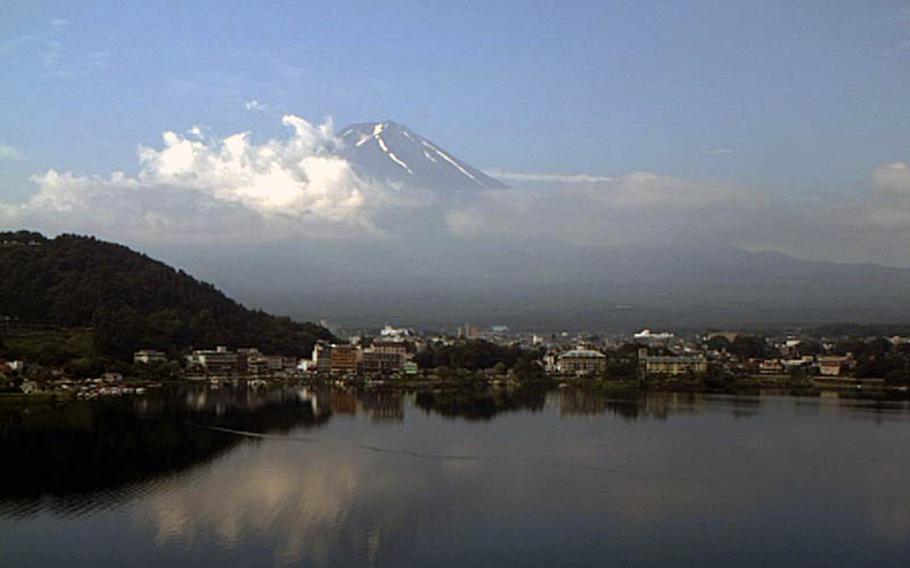Migration
Weather adds to the challenge of climbing Mount Fuji
Stars and Stripes July 27, 2011

Members of American 300, a non-profit group that works with the U.S. military, two world-class climbers and dozens of U.S. troops took on the challenge of climbing Mount Fuji despite a bout of challenging weather over the Fourth of July weekend. (Photo courtesy of American 300)
Members of a nonprofit group who work with the U.S. military, two world-class climbers and dozens of U.S. troops found more of challenge than expected while attempting to climb Japan’s Mount Fuji on Independence Day weekend.
When Rob Powers, founder of the American 300 nonprofit group that sponsors activities for military members, learned that soldiers from the 83rd Ordnance Battalion from the Kure Ammunition Depot Complex were climbing Fuji, he said he wanted to make the trip a bit more memorable for them.
Powers invited Himalayan climbing great Sherpa Chhiring Dorje and Eric Meyer, an American high-altitude medicine doctor and climber involved in the 2008 K2 expedition rescue.
Powers also invited Marines from Camp Fuji to join the hike.
Ed Bell, board chairman for American 300, said his organization wanted to use the climb to connect with the military members in Japan.
Before taking on Mount Fuji, members of American 300 visited Camp Fuji and Sherpa Dorje and Meyer shared their experiences from the 2008 disaster on K2 — second highest mountain on earth — which claimed the life of 11 mountaineers.
When they finally made it to Mount Fuji to start the climb, they found heavy rain and dangerous wind gusts of 60- to 70-mph. Of the 85 hikers who started the climb, only 26, including all four civilian visitors, made it to the summit.
“Totally tougher than what you’d expect – any sane person would have turned around,” laughed Meyer. “There was one point when we were in kind of a scrum and the wind hit us with one of those gusts and it would have knocked us off individually if we weren’t scrummed up.”
But Meyer said climbing a mountain is never easy.
“I’m always humbled by the mountain,” Meyer said. “I got blown down a couple of times on Everest too, and had I not been roped in I would have died. The mountain always deserves a little humility, no matter what mountain it is. The mountain can often times test you in ways you never imagined.”
Meyer was also impressed with the way the military members on the hike communicated, pushed themselves, and then made their own decision on just how far to go.
“They displayed incredible decision making, with no one putting themselves in the danger zone and no one pushed beyond the risk and reward,” Powers said.
Meyer also liked the military hikers’ organizational sense and their esprit de corps, he said.
“These younger guys were just pumped to be in a cause where they were being challenged to the hilt,” Meyer said
Meyer said he’s seen the tragic results when communication breaks down on a mountain.
Marine Sgt. Nicolas Garcia said they were surprised by the horrible conditions.
“When we were at station seven we couldn’t see anything,” Garcia said. “No one expected it to be as bad as it was.”
Even though he’s climbed to the top before, he decided to call it quits on this trip.
Staff Sgt. Luis Meraz, also stationed at Camp Fuji, made the decision to keep pushing himself despite the lack of visibility and heavy winds.
“I was one of the few to make it to the top,” Meraz said. “I didn’t want to disappoint myself or do it again.”
For Meraz, an avid hiker who used to work out hiking in the Russian Alps, he said summiting Fuji was quite a challenge.
“The hike was incredibly tough,” Meraz said. “I thought I was going to die. We almost fell into the crater going up.”
For more: http://www.city.fujiyoshida.yamanashi.jp/div/english/html/